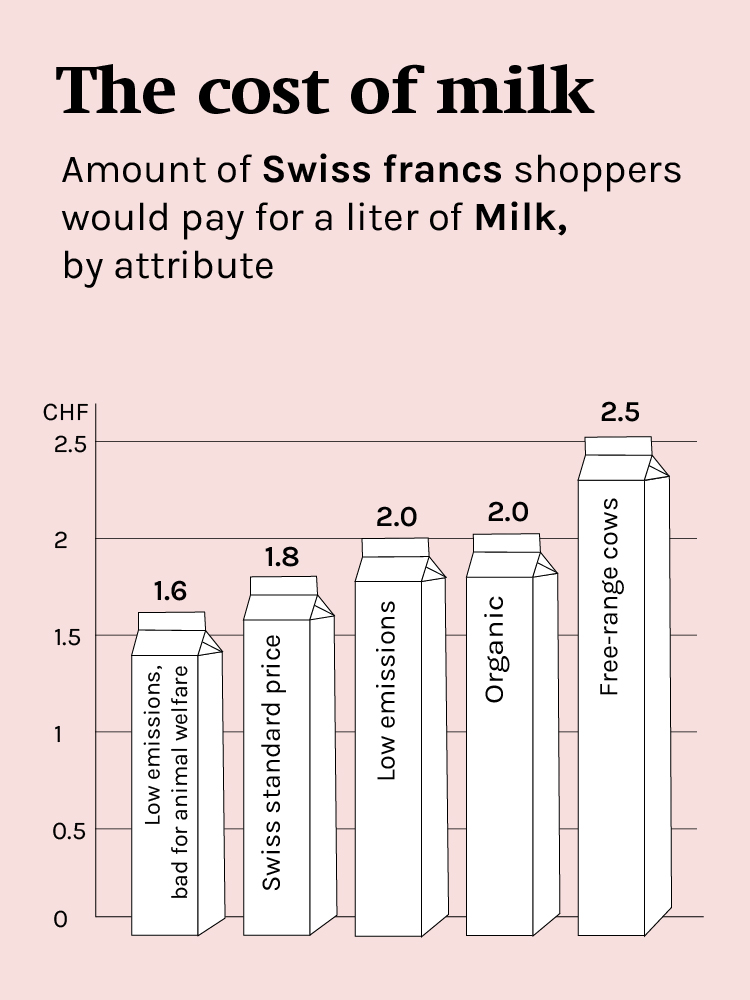Spending big on cow welfare
Consumers in Switzerland are prepared to spend much more money on cow’s milk products if they have been produced in an animal-friendly way, and this factor is even more important to them than climate sustainability, as shown by a new study by the University of Basel.
29 January 2025 | Olivia Fischer
Consumers in Switzerland value the well-being of cows in Switzerland. But how much are they actually willing to spend on animal welfare? Sebastian Richter, former Sustainable Development Student (now at the Research Institute of Organic Agriculture, Fibl) and Professor Aya Kachi from the University of Basel investigated exactly that and published their results in the journal Food Quality and Preference.
The study investigated which type of milk and butter people from Switzerland prefer. The researchers surveyed almost one thousand people using an online questionnaire. Each person had to decide which production characteristics of milk or butter were important to them and which less so.
This allowed the researchers to learn which characteristics they preferred: organic milk or milk produced locally? A block of butter which causes fewer greenhouse gas emissions during production, or butter from cows that are always free to move around?
Almost one franc more for animal welfare
Analysis of the survey showed that if a liter of milk cost CHF 1.80 as standard, respondents were willing to pay up to 72 centimes more per liter as long as the dairy cows were free to move around at all times and were not kept on a leash. By comparison, a liter of organic milk performed poorly: consumers were only willing to pay 22 centimes more for this.
Aya Kachi, Professor of Political Economy and Energy Policy at the University of Basel, has a hypothesis why the welfare of cows is so important in Switzerland. “Here in Switzerland, we have a close connection to cows. We regularly encounter the animal when out hiking or in rural areas. For us, the cow is not an abstract idea, but a creature we empathize with because we are familiar with it.”
The impact of climate change on purchasing decisions
While animal welfare is a concrete concern, many shoppers perceive climate change as abstract; it seems to trigger fewer emotions that influence product choice. This is reflected in the results of the study: respondents were willing to pay a maximum of 20 centimes more for a liter of milk that had caused very little greenhouse gas production. The preference for animal welfare became even clearer when survey participants were given the choice between environmentally friendly milk with poorer conditions for farm animals or very animal-friendly milk. In this case, the latter was clearly preferred.
“I find it sobering that Swiss consumers’ appetite for low-emission milk production is so much lower compared to their excitement for cow welfare enhancements.” says Aya Kachi. “At the same time, the results show that consumers are entirely prepared to spend more money on milk if they see added value in it.” This represents an opportunity: if people in Switzerland actually paid 72 centimes more per liter of milk, that would mean up to an extra CHF 2.73 per capita per month.
This additional income would enable farmers to invest in more animal-friendly barns. The money left over, as well as additional direct payments, would also boost farm incomes. The findings of the study could also be useful to politicians who advocate for better animal welfare.
Animal-friendly milk in the supermarket
How can producers make clear to customers that their milk comes from cows reared under particularly humane conditions? “An animal welfare label is the usual way of communicating this,” explains Kachi, “but there’s a veritable jungle of labels in Switzerland – so many that most shoppers don’t know exactly what the individual symbols mean.”
Her suggestion: “One alternative would be for the packaging to show, for example, which farm the milk comes from, including a picture of the farmer and a statement about how animals are kept on their farm.” This would make it easy for customers to understand and grasp the information.
Original publication
Sebastian Richter et al.
Animal welfare has priority: Swiss consumers’ preferences for animal welfare, greenhouse gas reductions and other sustainability improvements in dairy products.
Food Quality and Preference (2024), doi: 10.1016/j.foodqual.2024.105350
Further information
University of Basel, Communication & Marketing, email: kommunikation@unibas.ch




